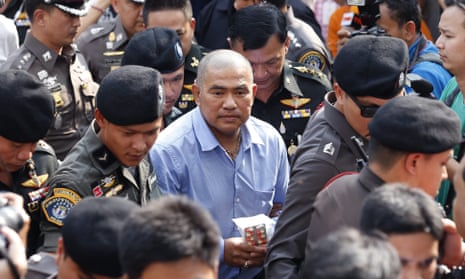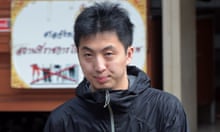A Thai fortune teller held under the country’s strict lese-majesty laws has died in military custody, officials have said. It is the second time within weeks that a high-profile figure detained in a largely secret investigation has been found dead.
Thai authorities said Suriyan Sucharitpolwong, better known by his soothsayer name Mor Yong, died of a blood infection on Saturday evening, hours after he was found unconscious in his cell at a Bangkok army barracks.
Thailand’s corrections department said the 53-year-old was taken to hospital after he was discovered by guards. “A hospital tried to revive him for about an hour but they were unsuccessful,” the statement said, adding that an autopsy carried out the next day showed he had succumbed to blood poisoning.
Suriyan’s death raises questions over the military’s role in a lese-majesty investigation that has swept up a string of high-profile figures and captivated local media.
Thailand’s King Bhumibol Adulyadej, 87, and his family are protected by one of the world’s toughest royal defamation laws, and the number of prosecutions under it has leapt since a military coup in May 2014.
Suriyan was arrested last month alongside his assistant and Prakrom Warunprapa, a major in the police force who authorities later announced had hanged himself while in military custody. The police officer’s body was swiftly cremated.
The trio were last seen in public on 21 October being led, hands bound and heads shaved, into a military courthouse where they were charged with a string of offences including royal defamation. Prakrom was dead two days later.

The Thai justice minister, Paiboon Khumchaya, said on Monday that there was no need to change procedures, despite the deaths.
“Sometimes prisoners die in prison,” he said, adding that a fraud suspect had recently passed away in detention. “But there was no report [by the media] because he was not a man in the news,” Paiboon said.
The majority of those prosecuted for royal defamation are punished for expressing views critical of the monarchy, and many have been given decades-long jail sentences.
But a dozen or so recent cases have involved palace or establishment figures charged with improperly using their connections with the monarchy to make money. These investigations have been shrouded in secrecy.
Among others accused are more than half a dozen relatives of Crown Prince Vajiralongkorn’s former wife, Princess Srirasmi, who have been jailed in closed court proceedings.
The prince divorced Srirasmi late last year and she gave up her royal titles following allegations that some of her relatives, including a senior police officer, had run a corrupt patronage network. A Thai police officer accused of involvement in that case also died in police custody.
There are scant details of the ongoing investigation against Suriyan, as is common in royal defamation cases. Even when the allegations are known, journalists must self-censor in order to avoid falling foul of the draconian laws themselves.
Thai authorities confirmed on Monday that a colonel in the military was also being investigated in the same inquiry as the soothsayer, but he had absconded.
Thailand’s coup-prone military portray themselves as the ultimate defender of the monarchy and it is very rare for soldiers to be caught up in lese-majesty inquiries.
The ultra-royalist junta chief Prayuth Chan-ocha seized power in a coup that toppled the democratically elected government of Yingluck Shinawatra after months of political chaos and street protests.
Prayut says his coup was needed to restore order to the politically turbulent nation, while critics say it was the another move orchestrated by the country’s elite to grab power and prevent democracy from taking root in the kingdom.






